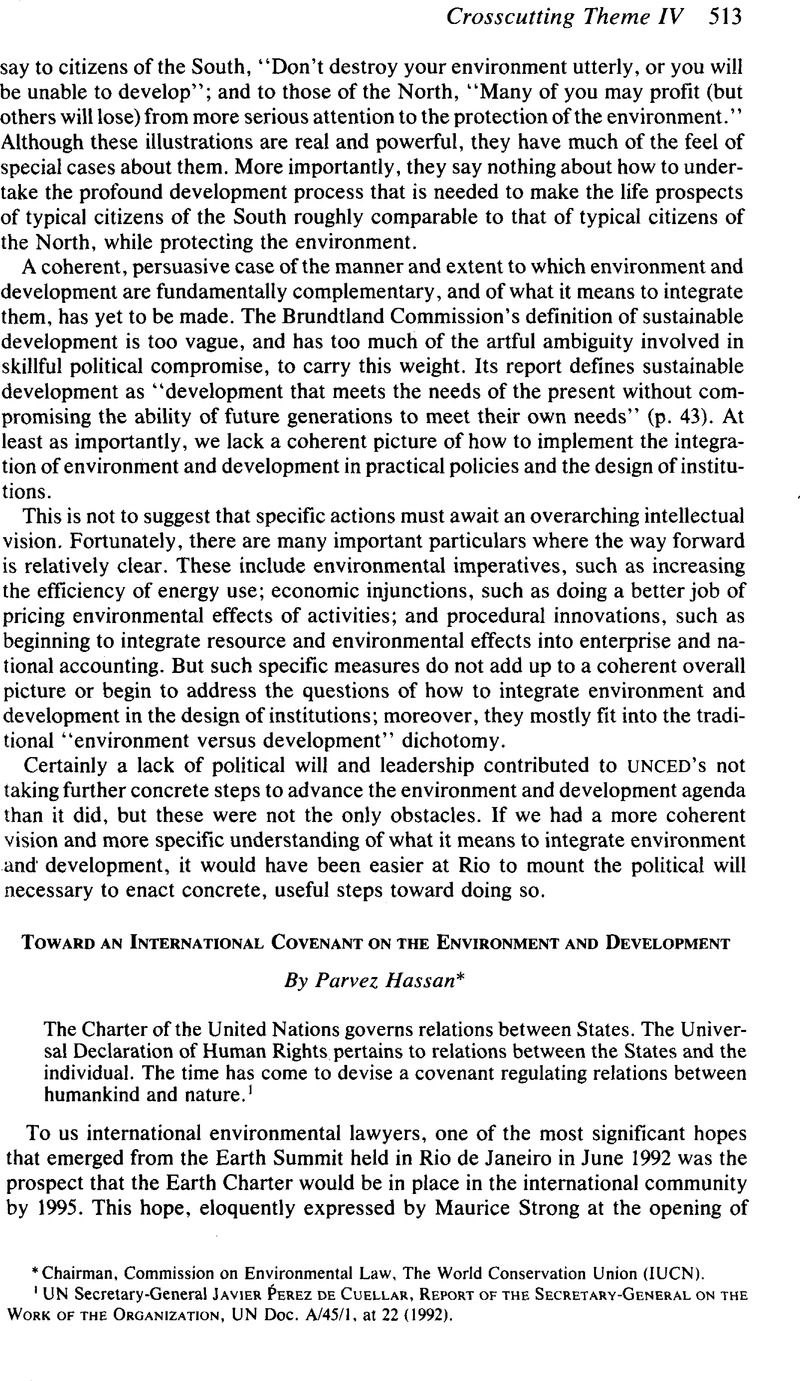Article contents
Toward an International Covenant on the Environment and Development
Published online by Cambridge University Press: 28 February 2017
Abstract

- Type
- Lessons Learned from UNCED
- Information
- Copyright
- Copyright © American Society of International Law 1993
References
1 UN Secretary-General JAVIER Ṕerez de Cuellar, Report of the Secretary-General on the Work of the Organization, UN Doc. A/45/1, at 22 (1992).
2 11 1LM 1416 (1972).
3 See generally Kiss, Alexandre and Hassan, Parvez, General Environmental Concerns, in Sand, Peter H., The Effectiveness of International Environmental Agreements, at 28–58 (1992)Google Scholar.
4 3 UNRAA, p. 1905.
5 2 UNRAA, p. 281. See also the Corfu Channel case, ICJ REP. 1949, at 4.
6 The preparatory work in respect of this Declaration, particularly in the context of the North-South divide, is discussed in Hassan, U.N. Declaration on Permanent Sovereignty over Natural Wealth and Resources (1963) unpublished, on file at Yale Law Library.
7 The United States was the only country that voted against the World Charter in the 111 to 1 vote.
8 Quoted in Burhenne, Wolfgang E. & Irwin, William A., The World Charter for Nature 14 (1986)Google Scholar.
9 The Proceedings of the Rio Conference and the Prepcoms have been compiled in Robinson, Nicholas A., Hassan, Parvez, and Burhenne-Guilmin, Francoise, Agenda 21 and the Unced Proceedings (1992)Google Scholar.
10 UNCED saw the emergence of a third category of interests beyond the political blocks of North and South. This was “countries in economic transition,” comprising the former socialist countries.
11 See generally Sir Shridath Ramphal, Our Country, The Planet (1992). This is one of the most eloquent expositions of North-South issues that has emerged in recent years.
12 See generally chapter 33. Articles 20 and 21 of the Convention on Biological Diversity are also good examples of the current consensus in the international community that the developed countries have special obligations with respect to financing environmental efforts in the developing countries. The Tokyo Declaration on Financing Global Environment and Development, reprinted in 22 ENVTL. POLY & L. (265–66) (1992), is yet another typical statement of such obligation of the developed countries.
13 UN Doc. A/Conf.l51/PC/WG. III/4.
14 This section draws from the author’s inaugural address, Moving Towards a Just International Environmental Law, at the International Environmental Law Conference, The Hague (August 12–16, 1991). This is reproduced in Bilderbeek, Simone, Biodiversity and International Law 72–75 (1992)Google Scholar. See also the author’s keynote addresses on Challenges and Prospects for a New Environmental Order in the Asian Region, delivered at the International Conference on Environment and Law at Kathmandu, Nepal (March 6–8, 1992), and on Rio ‘92: Prospects and Challenges, delivered at the International Symposium on Law, the Environment and the Quality of Life at Bahia, Salvador, Brazil (May 26–29, 1992).
15 See generally Hassan, The International Bill of Human Rights, 26 Pakistan Horizon, No. 4, at 28–42 (1973); Article 9(1) of the International Covenant on Civil and Political Rights: Background and Perspective, 3 Denver J. of Int’l. L. & Pol. 153 (1973); The Word “Arbitrary” as Used in the Universal Declaration of Human Rights: “Illegal” or “Unjust”?, 10 Harvard Int’l L. J. 225 (1969); and The International Covenants on Human Rights: An Approach to Interpretation, 19 Buffalo L. Rev. 35 (1968–69).
16 See the orders of Mr. Justice Saleem Akhtar in Human Rights Case No. 3IK/1992 (Q): Environmental Pollution in Balochistan.
17 Narman, Anders, North-South Co-operation: Development or Destruction? in Dev. Alternatives Newsl., November-December 1992 Google Scholar, at 12.
- 1
- Cited by


